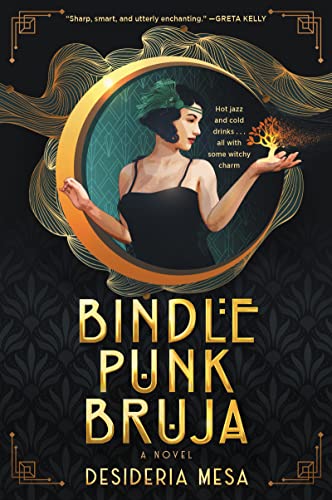Rose works by day as a newspaper reporter. By night, she runs someone else’s speakeasy. She’s not without dreams: she wants her own gin joint, wants to be her own boss, wants to get out from under the thumbs of the cruel, sexist, ambitious men who think they know all about her. In fact, they see just another bubbly party girl with a pasty, pretty face, which means they don’t know jack.
Rose was born Luna, a Mexican-American woman whose Caucasian father gave her the gift of a pale enough complexion for her to pass for white. Therefore, she escapes much of the persecution and prejudices that plague her darker skinned family though she must be ever on guard against anyone finding out about her heritage. If that’s not enough, she also happens to be the inheritor of a special power: earth magic. For now, it is a minor thing—a power she can tap into through kisses and physical (often sexual) contact. It grants her the ability to read motivations and to influence them. It’s a power she can learn more about, but for now she must keep concealed because there’s a group of hunters out there searching for such people.
These days she is two people inhabiting one body: Rose to the normal world of Kansas City, and Luna to her family and the supernatural one they occupy. In time, she will make her own opportunities and find her way to realizing her desires/dreams. Along the way, she will make plenty of enemies, and though she believes she can handle them all herself, Rose will learn that she cannot stand alone against all adversaries.
Can she accept her place as the head of a new community of outsiders, turning her enemies against each other and accepting her real heritage as a practitioner of magic? Desideria Mesa blends character studies with a plot about gangsters, haters, and horrible cis white men in the 1920s set fantasy novel, Bindle Punk Bruja.
At its core, Bindle Punk Bruja has a fascinating concept. The roaring twenties period, the possibilities for internal and external conflicts, the blend of honest journalism (in an age of yellow dog sensationalism and fakery) and criminal enterprises, the period spin on sisters doing it for themselves and taking ownership of their own bodies (flappers might seem quaint, but they were outrageous in their day), and the threat of Tommygun justice … There’s a lot of potential here, stuff that is rife for exploration and exploitation.
Alas, the finished product is not interested in quite the same things I was when first cracking the covers.
Initially aiming to be a character study, the book does not start with a bang. We get a sense of some dynamics between members of Rose’s family and a full on look at the racism of the era. Eventually, Rose gets caught up in actual plot, building her stake to get her own joint, and dealing with prejudices along the way. In time, there will be a lot of people serving as antagonists and obstacles, upstanding citizens who cannot see her as anything other than a woman, Ku Klux Klansmen who see her as slumming with anti-American elements like Mexicans and homosexuals, gangsters who want a piece of the action … and to control her body. Rose’s world is very much a whirlwind of problems, one after another.
However, the real thrust of the story is the breaking down of the illusion of independence. No one who lasts long in this world does so by being their own person, they find a community to belong to or else attract one around themselves. Rose’s community is a mix of minorities: her Mexican-American brother, mother, and abuela (grandmother), a closeted homosexual black sheep of a prominent family, a closeted Jewish man with ties to organized crime … At regular intervals, Rose finds herself attracting the outsiders like herself, men who reveal their inner secrets (though she asks them not to). This is her community whether she likes it or not. It is a group that will forgive her secret dealings and betrayals and stand by her. It’s a community she never once earns yet grows into.
Taking the book for what it’s doing instead of what I’d prefer to have seen is a challenge here. The slowness in the opening provoked a desire to close the covers and return it to the shelf. Perseverance is rewarded, when the actual plot comes to the fore and kicks off numerous setbacks and victories. Here is where the book best holds the attention. However, once the book is done, and we move past the sense that there will be an inevitable sequel or series to follow it up (Bindle Punk Jefe is hitting shelves later this year, just in time for Hallowe’en), the chance to see all those missed opportunities is glaring. Bindle Punk Bruja has some enjoyable moments but overall, the book does not satisfy.
Someone will still have the chance to tap into the possibilities that went unexplored here in another work. Perhaps the author herself will do so in a book that tackles the obvious setup of those mentioned but untapped witch hunters in the 1920s. A little more pulp might make the author’s intentional provocations work better. Even John Lennon and Yoko Ono realized the need for a catchy jingle on which to deliver their deeper meaning.
#
Bindle Punk Bruja is available in eBook, paperback, and audiobook editions.
“Gin Joints and Magic Nights: Desideria Mesa’s Bindle Punk Bruja” is copyright © 2023 by Daniel R. Robichaud. Cover image taken from the Harper Voyager eBook edition, released in 2022.
Disclosure: Considering Stories is a member of the Amazon Associates. Under that program, purchases made using the product links in any of our articles can qualify the Considering Stories site for a payment. This takes the form of a percentage of the purchase price, and it is made at no additional cost to the customer.
